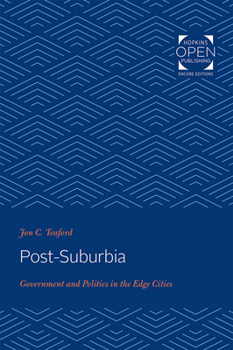Post-Suburbia: Government and Politics in the Edge Cities
Select Format
Select Condition 
Book Overview
The years shortly after the end of World War II saw the beginnings of a new kind of community that blended the characteristics of suburbia with those of the central city. Over the decades these "edge cities"have become permanent features of the regional landscape.
Originally published in 1996. The years shortly after the end of World War II saw the beginnings of a new kind of community that blended the characteristics of suburbia with those of the central city. Over the decades these "edge cities" have become permanent features of the regional landscape. In Post-Suburbia, historian Jon Teaford charts the emergence of these areas and explains why and how they developed.
Teaford begins by describing the adaptation of traditional units of government to the ideals and demands of the changing world along the metropolitan fringe. He shows how these post-suburban municipalities had to fashion a government that perpetuated the ideals of small-scale village life and yet, at the same time, provided for a large tax base to pay for needed municipal services. To tell this story, Teaford follows six counties that were among the pioneers of the post-suburban world: Suffolk and Nassau counties in New York; Oakland County, Michigan; DuPage County, Illinois; Saint Louis County, Missouri; and Orange County, California.
Although county governments took on new coordinating functions, Teaford concludes, the many municipalities along the metropolitan fringe continued to retain their independence and authority. Underlying this balance of power was the persistent adherence to the long-standing suburban tradition of grassroots rule. Despite changes in the economy and appearance of the metropolitan fringe, this ideology retained its appeal among post-suburban voters, who rebelled at the prospect of thorough centralization of authority. Thus the fringe may have appeared post-suburban, but traditional suburban attitudes continued to influence the course of governmental development.





